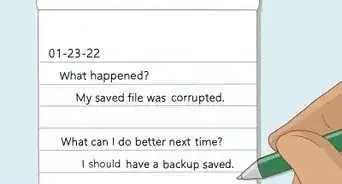This article was co-authored by Adrian Klaphaak, CPCC. Adrian Klaphaak is a career coach and founder of A Path That Fits, a mindfulness-based boutique career and life coaching company in the San Francisco Bay Area. He is also is an accredited Co-Active Professional Coach (CPCC). Klaphaak has used his training with the Coaches Training Institute, Hakomi Somatic Psychology and Internal Family Systems Therapy (IFS) to help thousands of people build successful careers and live more purposeful lives.
There are 7 references cited in this article, which can be found at the bottom of the page.
wikiHow marks an article as reader-approved once it receives enough positive feedback. In this case, 93% of readers who voted found the article helpful, earning it our reader-approved status.
This article has been viewed 446,101 times.
It can be incredibly stressful to be unhappy at work. If you're struggling to enjoy your job, you're not alone. Many people let the daily grind get to them. However, there are a few things you can do to enjoy yourself. Try to think more positively, change your work habits, and develop a quality work/life balance.
Steps
Altering Your Mindset
-
1Change your internal monologue. How do you think about yourself and your job? Negative thoughts are probably not helping you enjoy yourself. Work on being conscious of what you're thinking and replacing negative thoughts with positive ones.[1]
- For example, stop when you think things like, "This job is awful and I'll never get a better one." Instead, try to focus on the positive aspects of your job.
- For example, instead think something like, "This job stresses me out because it's complicated, but I'm learning a lot. This will be beneficial for my career."
-
2Stop hanging out with negative people. In every place of work, there are chronic complainers. There is no need to hang out with people who complain frequently as such people will only drag you down. Surround yourself with positive people at your office to avoid being weighed down by the negative.[2]
- For instance, eat your lunch alone or talk a walk (weather permitting) instead of eating in the breakroom with negative colleagues.
- Don't engage in office gossip, as it can make a bad situation worse. Not only does this contribute to feelings of negativity, it could potentially get you in trouble with your boss or superiors.
Advertisement -
3Create a positive mental image. Have a place in your mind where you can take a mental vacation when you're feeling stressed. Close your eyes and imagine a relaxing scenario. Try to use all your senses to envision how this place feels, smells, tastes, and so on.[3]
- For example, say you love camping. If you get stressed, close your eyes and imagine being in a tent in the woods. Think about how nature feels, sounds, tastes, and smell for a few moments. This should calm you down.
- You can also use aromatherapy to relax. Choose essential oils in calming scents, like lavender or chamomile, and dab a drop on each of your pulse points.
- Or, drink herbal teas that promote relaxation.
-
4Keep the benefits of work in mind. Everyone works for a reason. Even if your job isn't something that's going to change the world, you need to work to afford basic necessities like food and shelter. If you find yourself stressed by work, think something like, "This job may be stressful, but I'm lucky to get a paycheck."[4]
- It can help to think about buying small rewards every time you get paid. For example, order take out every payday. This way, you will keep the benefits of your job in mind.
- Each time you make a necessary purchase, remember how your paycheck contributed to this. Think to yourself, "I'm lucky I'm able to work so I can buy these groceries."
-
5Take note of positive contributions you make. Think about the good things you do at your job, even small things. If you're working a dull data entry job at a non-profit, think about how data entry benefits the organization overall. Even if you're a tiny cog in the machine, you're keeping it going and you should be proud of that.[5]
- Even if you're not passionate about your job, maybe you bring something to the office. If you're kind to your co-workers, you probably contribute to a positive work atmosphere.
- Even low level jobs are important. Handing someone a latte at a coffee shop can make their day, even if you don't think much of the task.
- If you’re feeling bored and have outgrown your job, think about the changes you can make to help alleviate the boredom you feel.
Making Changes at Work
-
1Request new responsibilities that interest you. If you're doing the same task day in and day out, this can get repetitive and boring. Instead of accepting the tasks you're dealt, volunteer to do something new. Approach your boss and ask if you can take on some new responsibilities in the office.[6]
- See if there are any places in your office where extra help is needed. For example, maybe your company's social media profile is a little lax. Volunteer to ramp it up a little.
-
2Make to-do lists. One reason people dislike work is that they feel overwhelmed. If you go into work every day feeling incredibly stressed, you're likely to be unhappy. Work on organizing tasks into a to-do list every day to help yourself remain calm.[7]
- Prioritize items on your list. For example, separate it into sections of items that need to be done today and items that could wait.
- You'll get a feeling of accomplishment crossing items off your to-do list. This can lead to you enjoying your job as you'll feel a sense of pride.
-
3Concentrate on one thing at a time. If you're concentrating at the task at hand, you'll have less time to think about stress or dissatisfaction. When working on something, give it your full attention and push worries or fears out of your mind. This will keep you occupied, allowing you to better enjoy your work.[8]
- If you have a lot of downtime, you may find yourself worrying then. If management approves, bring things like books and crossword puzzles to the office to keep yourself occupied during downtime.
- It can initially be hard to focus on one thing at a time. It takes practice, but with time you should be able to increase your concentration, leading to a happier work environment.
-
4Take action to change your job for the better.[9] If there's something you don't love about your job, take action to change it. Bosses love employees that are always looking for ways to better the office, so be on the lookout for ways to make positive changes that benefit everyone. Just make sure to avoid criticizing the process or protocol and present your ideas with a positive attitude.[10]
- For example, say you're using a somewhat dated software in the office. Suggest that your boss upgrade to a software that's easier to use. Volunteer to teach other employees how to use the software so things run smoother.
- Maybe some people are struggling with deadlines. Volunteer to teach a brief class on time management with employees to improve productivity.
-
5Teach yourself a new skill.[11] If you're feeling like your job is stagnant, try to learn something new. Whether it's a software you don't know how to use or a particular type of copywriting, use downtime at work to forge new skills. If your boss sees you've learned something new, you may be able to move up in the office. This can lead to better positions down the road.[12]
-
6Take breaks during the day. If you get 5-minute breaks, take them. Stretch your legs, take a walk, have a snack, or do something else to relax. Even if you don't have actual breaks, get up for about 30 seconds and stretch. Even tiny breaks from work help.
- If you get an hour break, ask if you can break it up into 15-minute breaks. This can help you feel like you get more time to yourself.
Developing a Work/Life Balance
-
1Switch off when you leave. If you find yourself thinking about your job after leaving work, try to avoid this. Think to yourself, "I did what I could today, and now I can relax." When you're not at work, focus on things like your hobbies, friends, family members, pets, and other aspects of life outside the office. You work hard and are entitled to unwind at the end of the day.
- Try to avoid talking or complaining about your job after work. This only exacerbates the issues, and it’s best not to bring work into your home life.
-
2Remember you are not your job. If you're unsatisfied at work, you may internalize these feeling and start feeling negative about your life overall. Strive to remind yourself you are not your job. You have other things going on, like friendships and family obligations, outside the office. Place your focus here when you feel discouraged.[13]
-
3Volunteer on the side.[14] Not everyone can work a job that fulfills their dreams. If you're not in the exact field you love, pursue your passions outside of work. Volunteer at an organization that could use extra help.[15]
- For example, if you're working an office job, but your goal is to work with kids, volunteer at a daycare, library, or school to help tutor kids.
-
4Indulge your hobbies and passions.[16] Work doesn't have to be your only outlet in life. Think about your passions and find ways to indulge them on the side. Form a band with friends if you're interested in music. Join a local theater troupe if you're interested in acting. There are many things you can do to feel fulfilled outside of work.[17]
-
5Ask to telecommute some days. Sometimes, simply being out of the office can help you feel more positive and energetic about your job. Telecommuting can help you develop a better work/life balance. See if your office has policies regarding telecommuting and ask if you can work from home some days.[18]
-
6Consider speaking to a therapist. Sometimes, it’s not the job that’s the problem, and it may be that underlying issues are making you unhappy. Talking to a therapist can help you work through these problems and pinpoint if you are suffering from anxiety or depression.
Expert Q&A
-
QuestionWhat if I have two jobs and I'm not enjoying either of them?
 Amber Rosenberg, PCCAmber Rosenberg is a Professional Life Coach, Career Coach, and Executive Coach based in the San Francisco Bay Area. As the owner of Pacific Life Coach, she has 20+ years of coaching experience and a background in corporations, tech companies, and nonprofits. Amber trained with the Coaches Training Institute and is a member of the International Coaching Federation (ICF).
Amber Rosenberg, PCCAmber Rosenberg is a Professional Life Coach, Career Coach, and Executive Coach based in the San Francisco Bay Area. As the owner of Pacific Life Coach, she has 20+ years of coaching experience and a background in corporations, tech companies, and nonprofits. Amber trained with the Coaches Training Institute and is a member of the International Coaching Federation (ICF).
Pacific Life Coach Working two jobs takes a lot of energy. You aren't going to enjoy either job if you're tired all of the time. It's imperative that you schedule plenty of breaks into your schedule so you don't go straight from working one job to another. Even if it's a one-hour break where you can just take a nap at home, it's really going to pay off. Also, make sure you take at least one full day and at least one full night off every week. You'll have a much easier time enjoying your work if you feel well-rested.
Working two jobs takes a lot of energy. You aren't going to enjoy either job if you're tired all of the time. It's imperative that you schedule plenty of breaks into your schedule so you don't go straight from working one job to another. Even if it's a one-hour break where you can just take a nap at home, it's really going to pay off. Also, make sure you take at least one full day and at least one full night off every week. You'll have a much easier time enjoying your work if you feel well-rested. -
QuestionWhat can I do if I'm not enjoying my job?
 Adrian Klaphaak, CPCCAdrian Klaphaak is a career coach and founder of A Path That Fits, a mindfulness-based boutique career and life coaching company in the San Francisco Bay Area. He is also is an accredited Co-Active Professional Coach (CPCC). Klaphaak has used his training with the Coaches Training Institute, Hakomi Somatic Psychology and Internal Family Systems Therapy (IFS) to help thousands of people build successful careers and live more purposeful lives.
Adrian Klaphaak, CPCCAdrian Klaphaak is a career coach and founder of A Path That Fits, a mindfulness-based boutique career and life coaching company in the San Francisco Bay Area. He is also is an accredited Co-Active Professional Coach (CPCC). Klaphaak has used his training with the Coaches Training Institute, Hakomi Somatic Psychology and Internal Family Systems Therapy (IFS) to help thousands of people build successful careers and live more purposeful lives.
Career Coach Try to take on projects that will improve your work environment and have a positive effect for the company. This can help you feel closer with your coworkers and career.
Try to take on projects that will improve your work environment and have a positive effect for the company. This can help you feel closer with your coworkers and career.
References
- ↑ Amber Rosenberg, PCC. Pacific Life Coach. Expert Interview. 26 February 2019.
- ↑ https://www.forbes.com/sites/erikaandersen/2013/10/28/6-ways-to-like-your-job-more/#16127c984c7c
- ↑ https://www.forbes.com/sites/nextavenue/2014/11/17/how-to-love-your-job-even-if-you-dont-like-it/#1c12a3472cb3
- ↑ https://www.becomingminimalist.com/enjoying-9to5/
- ↑ https://www.becomingminimalist.com/enjoying-9to5/
- ↑ https://www.forbes.com/sites/nextavenue/2014/11/17/how-to-love-your-job-even-if-you-dont-like-it/#1c12a3472cb3
- ↑ http://theundercoverrecruiter.com/12-kickass-ways-love-your-job-and-life/
- ↑ http://theundercoverrecruiter.com/12-kickass-ways-love-your-job-and-life/
- ↑ Adrian Klaphaak, CPCC. Career Coach. Expert Interview. 18 December 2018.
- ↑ https://www.themuse.com/advice/4-changes-you-should-embrace-if-you-want-to-enjoy-your-job-more
- ↑ Adrian Klaphaak, CPCC. Career Coach. Expert Interview. 18 December 2018.
- ↑ https://www.forbes.com/sites/erikaandersen/2013/10/28/6-ways-to-like-your-job-more/#16127c984c7c
- ↑ Amber Rosenberg, PCC. Pacific Life Coach. Expert Interview. 26 February 2019.
- ↑ Adrian Klaphaak, CPCC. Career Coach. Expert Interview. 18 December 2018.
- ↑ https://www.forbes.com/sites/nextavenue/2014/11/17/how-to-love-your-job-even-if-you-dont-like-it/#1c12a3472cb3
- ↑ Adrian Klaphaak, CPCC. Career Coach. Expert Interview. 18 December 2018.
- ↑ https://www.forbes.com/sites/nextavenue/2014/11/17/how-to-love-your-job-even-if-you-dont-like-it/#1c12a3472cb3
- ↑ https://www.forbes.com/sites/nextavenue/2014/11/17/how-to-love-your-job-even-if-you-dont-like-it/#1c12a3472cb3
















































































